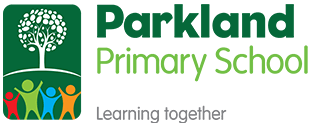Computing Curriculum
Intent
At Parkland Primary School, a high-quality computing education equips pupils to use computational thinking and creativity to understand and change the world. Computing has deep links with mathematics, science, and design and technology, and provides insights into both natural and artificial systems. The core of computing is computer science, in which pupils are taught the principles of information and computation, how digital systems work, and how to put this knowledge to use through programming. Building on this knowledge and understanding, pupils are equipped to use information technology to create programs, systems and a range of content. Computing also ensures that pupils become digitally literate – able to use, and express themselves and develop their ideas through, information and communication technology – at a level suitable for the future workplace and as active participants in a digital world.
Implementation
At Parkland Primary School, teachers work collaboratively using subject progression maps and knowledge mapping to coherently plan and sequence learning journeys designed to allow our pupils to gain cumulatively sufficient knowledge to ensure they are ready for the next stage of their education. Teachers plan Computing using the learning journey planning format. Computing is planned using a progression of skills document to ensure teaching is designed to help learners to remember, in the long term, the content they have been taught and to integrate new knowledge into larger concepts.
For Computing, we block learning and re-visit practice over time through a spaced practise approach (Learning Scientists, 2016) as research suggests this will lead to better long-term retention of knowledge. Retrieval practice is a fundamental part of our Computing curriculum as it is proven to strengthen memory and make it easier to retrieve the information later (Rosenshine, 2012).
Opportunities for retrieval practise occur in two places in the curriculum:
- Daily review to activate prior learning forms the start of most lessons.
- Retrieval practice of non-negotiable taught knowledge will happen on three separate spaced occasions away from the point of teaching the topic. This should support children in securing long-term knowledge acquisition.
Aims of Computing knowledge-led curriculum:
The national curriculum for computing aims to ensure that all pupils:
- can understand and apply the fundamental principles and concepts of computer science, including abstraction, logic, algorithms and data representation
- can analyse problems in computational terms, and have repeated practical experience of writing computer programs in order to solve such problems
- can evaluate and apply information technology, including new or unfamiliar technologies, analytically to solve problems
- are responsible, competent, confident and creative users of information and communication technology
EYFS
The EYFS framework is structured very differently to the National Curriculum as it is organised across seven areas of learning rather than subject areas. The skills taught across EYFS feed into the Computing curriculum but are not always taught as subject specific knowledge and skills. The most relevant early years outcomes for Computing are taken from the areas of learning within “Understanding the World: Technology”.
The knowledge and skills needed to achieve these outcomes are taught mostly through children playing and exploring during continuous provision times in the day. Teachers deliberately plan enhanced activities which give opportunity for children to learn through their own discovery. Some elements of Understanding the World are taught through Computing activities in which the children;
- recognise that a range of technology is used in places such as homes and schools,
- select and use technology for particular purposes.
KS1/KS2
Through KS1 and KS2, teachers use the Teaching Computing Curriculum resources on Teach Computing website https://teachcomputing.org/curriculum.
The National Curriculum statements are split into units which progress through each year group:
- Computing Systems & Networks
- Creating Media
- Data & Information Programming
The progression of skills document connects concepts, knowledge, skills and objectives.
By blocking these areas of Computing, then returning to them each academic year, deep learning opportunities are provided as children return to prior knowledge before building on it. Computing lessons are taught once weekly meaning a unit of Computing is completed each half term. Classes have a timetabled session in the ICT suite each week as well as access to mobile devices when required.
Each term teachers also plan an online safety lesson into their learning journey which is planned in line with Project Evolve.
Impact
Assessing Progress
Pupils’ progress is assessed using regular formative assessment in lessons through strategies such as questioning, regular retrieval practice, quizzing, independent learning tasks and assessment of work and feedback.
The knowledge and skills for each topic is assessed more formally using knowledge-based quizzes and/or a high-quality independent skills application outcomes e.g. designing a game using a specific type of software. Teachers will use this assessment to provide further feedback or re-teach concepts where necessary to close gaps and ensure pupils have mastered the curriculum content at that point. The aim is for the identified non-negotiable knowledge for Computing to be retrieved on three separate spaced occasions from the point of teaching. The aim of this approach is to secure long-term knowledge acquisition and provide more summative assessment information to support teachers in tracking progress.
Tracking Pupil Progress
In Computing, post assessments are used to assess the learning of each individual child. This may look different for each year group, depending on the topic that they are studying at the time and what has been taught in previous year groups.
Individual progress is reported to parents through two termly Parents’ Evenings and an end of year report.

